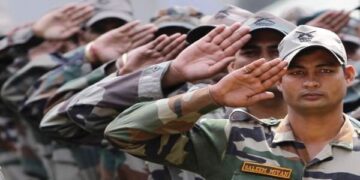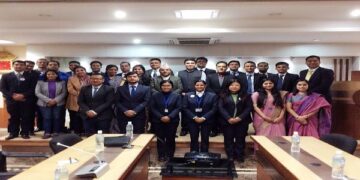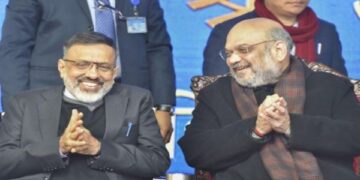Indian Foreign Service full form of IFS. It’s a civil service under Group A and Group B of the Central Civil Services of the Government of India. Moreover, the service is to manage foreign relations in India. It is certainly, the body of diplomats. Also, they serve in Indian Diplomatic Missions and International Organisations around the globe. Besides that, IFS represents the country in foreign territory. To Become an IFS Officer one must clear the UPSC CSE Exam. Also known as the Indian Foreign Service Exam. Above all, in this article, you will be guided on How To Become an IFS Officer?
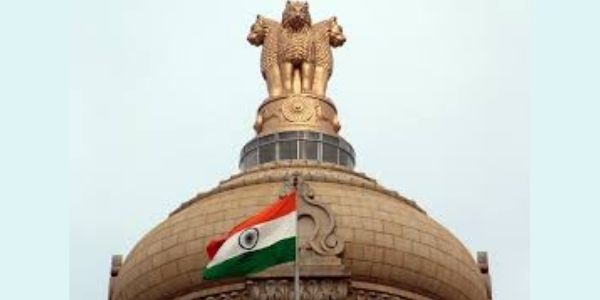
Indian Foreign Service
Subsequently, on the 9th of October 1946, the Indian Government set up the IFS full-form Indian Foreign Service. Moreover, for India’s representation overseas. After the independence of India, consequently, there was a near-complete change of the Foreign and Political Department. It transformed into what then became the new Ministry of External Affairs and Commonwealth Relations. Also, the Indian Cabinet created the Foreign Service. So, IFS Day is celebrated on 9 October every year since 2011.
Meanwhile, an IFS Officer serves at the headquarters of the Ministry of External Affairs in Delhi and the PMO. Above all, they head the Regional Passport Offices in the country. Also, hold offices in the President’s Secretariat and many ministries on appointment. However, the legislative and executive heads are the Foreign Secretary and the External Affairs Minister. IFS is different than other civil services. It deals with the country’s foreign affairs like diplomacy and, cultural relations.
How to become an IFS Officer?
Firstly, to become an IFS Officer the aspirants are to appear for the UPSC CSE Exam. Moreover, this exam is led by the Union Public Service Commission. Subsequently, this exam is in three stages. In other words, it’s considered the toughest exam in India. To clarify, the syllabus for the Indian Foreign Service (IFS) exam is the same as other civil services exam. Certainly, candidates get into the Indian Foreign Services as per his/her rank in the Indian Foreign Service Exam.
Exam Pattern
- Prelims are certainly, this is the first stage of the exam. However, it’s a completely objective type of exam. Prelims are the qualifying stage, hence their marks are not counted in the merit.
- Mains moreover, is the second stage of the Indian Foreign Service exam. Subsequently, this exam has a descriptive type of paper. Marks of this exam are considered while counting for merit.
- The interview is the last and final step of the selection process. However, it is a personality test. Above all, its main purpose is to check the ability of candidates to perform in a stressed environment.
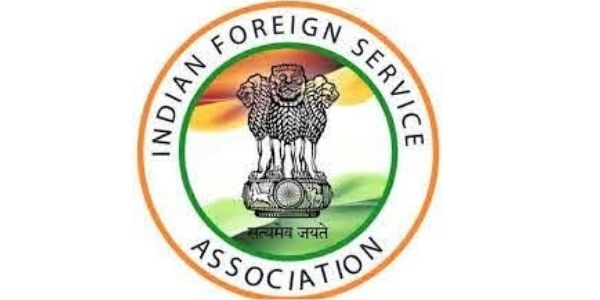
Syllabus
Prelims
Paper I (GS)
- History
- Geography
- Indian Politics
- Social and Economic Development
- Scientific Developments
- Biodiversity
- Ecology
- Climate change
Paper II (CSAT)
- Communication skill
- Comprehension
- Analytical and mental ability
- Logical reasoning
- Numeracy (Basic class X level): Magnitude. The relation between numbers. Graphs and data. Charts and tables.
Mains
Qualifying Papers on Indian Languages and English
Paper A
English Language:
- Comprehension of given passages.
- Precis Writing.
- Usage and Vocabulary.
- Short Essays.
Paper B
Indian Languages:
- Comprehension of given passages.
- Precis Writing.
- Usage and Vocabulary.
- Short Essays.
- Translation from English to the Indian Language and vice-versa.
GENERAL STUDIES
Papers
- I: Essay.
- lI: Indian Heritage and Culture, History, and Geography of the World and Society.
- III: Polity, Governance, Constitution, Social Justice, and International relations.
- IV: Technology, Economic Development, Biodiversity, Environment, Security, and Disaster Management.
- V: This paper will include questions to test the candidate’s attitude and approach to issues relating to integrity, probity in public life, and his problem-solving approach to various issues and conflicts faced by him in dealing with society.
- VI & VII Optional Subject Papers I & II
Indian Foreign Service (Eligibility)
The eligibility criteria for the IFS full form Indian Foreign Service exam are the same as for other civil services.
Age
Certainly, the applicant’s age is to be a least 21 years and a maximum of 30 years. The candidate should be 21 years old. Also, the candidate will not be allowed to appear in the exam if above 29 years. Above all, this rule is for General Category candidates.
Education Qualification
The candidate consequently, should have a bachelor’s degree or any equivalent from a verified institute or university.
Nationality
Certainly, the aspirant must be a citizen of India,
- A subject of Nepal.
- A subject of Bhutan or Refugee in India as a permanent citizen(Until January 01, 1962)
- Indian origin person to permanently settle in India forever.
- Needs to have a document proof of eligibility which should be issued by the GOI.

Skills Required
- The candidate should certainly, have excellent speaking and interpersonal skills
- Logical skills are also a key feature.
- Interest, as well as knowledge in foreign relations, is a must.
- Above all, diplomacy skills are to be wise.
- Decision-making skills are the most important, need for this job
- Leadership is certainly a required skill.
- The candidate should moreover be able to adapt to different situations and cultures.
- Also, the candidate should be sensitive to other cultures too.
Indian Foreign Service (Training)
IFS officer has a training period of around one year. Training is divided into 2 different parts:
Foundation Course
Foundation Course is led by Lal Bahadur Shastri National Academy of Administration (LBSNAA). However, the term of this course is around three and a half months. The final goal of this course is for the trainee officer to get familiar with the regulatory system. Learn political, economical, social, and administrative issues.
Induction Training Program
Induction Training Programme is led by the Sushma Swaraj Institute of Foreign Service (SSIFS), New Delhi. Also, the term of this program is nine months. The main aim of the program is to train the IFS officer to face the tests and problems of the 21st century. The program trains the IFS Officers with the necessary knowledge and skills.
After the end of the above training, trainees will receive training where they will be connected to a part of the Ministry of External Affairs for a period of six months. They will be then allotted a Compulsory Foreign Language such as Arabic, Chinese, French, German, Russian, Spanish, or others.
As a result, they will be posted as a Third Secretary in an Indian mission overseas. There they have to learn CFL. They have to clear a skill test led by the School of Foreign Languages. Then will they be approved as an IFS full form Indian Foreign Service Officer. A total of three years to finish training days.
Roles & Responsibilities
Subsequently, following are the duties of Indian Foreign Service Officer:
- An IFS officer must safeguard India’s affairs in the country of his posting.
- The Ministry of External Affairs (MEA) is liable for matters that concern India’s foreign relations. One of the parts is the Provincial division. It checks the economic, political, and respective matters. The other part is the functional division. It handles issues regarding multilateral structures. Also, various regional groupings, legal, press, publicity, policy matters, and many other issues.
- Must develop friendly relations with all the stakeholders in the nation of his/her posting.
- All progress that takes place in the country of appointment, which might influence the policies of India, must be reported.
- Trade on various subjects of interest with the concerned authorities in the country of posting.
- Represent India in its Embassies. Also, High Councils, Consulates in Foreign countries. Permanent Missions to Multilateral Systems like UN.
- Provide a path to Indian and Foreign nationals.
- The role of an IFS officer is a very encouraging and challenging one.
- To serve India on foreign grounds in the countries they are appointed. An IFS officer is a very important string for India. They play a vital role in growing Indian foreign policy and making all strategic and commercial ties with countries.
Salary and Other Perks
The salary and perks of this job are quite attractive. Above all, the IFS salary is around 60,000 monthly. Indian Foreign Service officers would also be given a Special Foreign Allowance. The value varies with the country of posting. If the candidate got their posting in foreign countries then they may receive a salary of 2.40 lakhs under a special foreign allowance. For example, when an officer is assigned to a mission in the USA, he/she can get $4000 monthly. Allowance rises with the grade of the officer. IFS full form Indian Foreign Service officers are also given house, household staff, official means, security, study options, and some retirement gains and pension.

FAQ | Indian Foreign Service
Indian Foreign Service is a civil service under Group A and Group B of the Central Civil Services of the GOI. The service is to manage foreign relations in India.
The service is to manage foreign relations in India by staying in a foreign territory. Also, serve the office of the Ministry of External Affairs in Delhi and the PMO.
Both IAS and IFS have their very own importance. IFS enjoys diplomatic immunity as they are posted abroad. Also, the salary of an IFS is higher than an IAS.
There are very few jobs for the IFS each year.
Last rank in 2018:
General Category – 134
OBC – 450
SC – 468
ST – 603
Editor’s Note | Indian Foreign Service
IFS full form (Indian Foreign Service) is certainly, a civil service of foreign affairs officers. IFS is different from other civil services. In other words, the officers are to be engaged in foreign relations. As a result, this article contains data on the exam pattern of IFS. Also, there is a specific record of the syllabus. You will also learn the roles and responsibilities of an IFS officer. To clarify, if you have read this article fully all the possible queries are revealed in-depth. Thank You for reading. All The Best.



